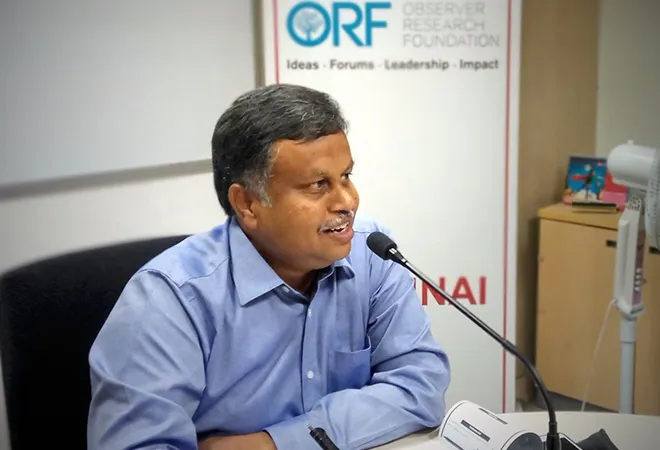-
CENTRES
Progammes & Centres
Location

“There are many challenges on the education front for the new generation kids but equally there are unlimited opportunities as well,” said Mr D Nedunchezhian, education counsellor and Founder-CEO, Technocrats India College Finder (TCIF). He was addressing the second in a four-part series ORF-Chennai Interaction for the annual Madras Day-2018 celebrations on 11 August. Nedunchezhiyan was speaking on "Education: Challenges and Opportunities” under the broader series them, of “Chennai for Gen 2K Millennium Kids, organised by ORF Chennai Chapter.
Initiating the discussion, Nedunchezhian, who has also been on various committees set up by the Centre and also the Tamil Nadu Government on education-related issues, said that the “reality is that both parents and students have limited awareness about the opportunities available to the new generation”. Unfortunately, there was no single information service portal that presented in a coherent way all the opportunities available in the country for Gen 2K kids, who are extremely net savvy. Lack of awareness was one of the biggest challenges “as even one wrong decision could have a long-term impact and difficulties in their careers”, he explained.
Nedunchezhian pointed to disconnect in the education/teaching process between schools and colleges. Schools were only focused on ensuring their students attained high marks and excelled in examinations. “Their greatest failure is not informing the students about the vast range of opportunities available to them after finishing their 10th and 12th examinations,” he said. The government, government-aided and private institutions needed to work together to bridge this gap between awareness and existing opportunities.
Students from rural Tamil Nadu were at a disadvantage when it came to appearing for several entrance examinations for professional courses. It was found that entrance exams in general favoured city/urban students, who had easier access to more examination centres. In addition, city students also had better access to the best coaching centres that were not available in the rural areas. Nedunchezhian said, “There is an urgent need to address issues of access for rural students, both to coaching and examination centres.” He also mooted the need for regional language examinations, for various higher education courses.
The trend in South India still seemed to be that students were not exploring their options beyond conventional courses, observed Nedunchezhian. There were several trans-disciplinary programmes available at present but the younger generation was simply not aware of. Integrated PhD programmes that combined neuro-science and engineering at IIT was one such course. Others included degrees in Intellectual Property Law and Medicine, Design and Information Technology, Architecture and Environmental Sustainability. Such integrated courses increased a student’s career prospects, manifold. Greater awareness of these courses was the need of the hour, he said.
Nedunchezhian criticised the fact that across the country, parents, teachers and students alike had not managed to break the common misperception that education is solely for employment. Referring to several Indians with successful career graphs – like the Chennai boy Sunder Pichai, CEO of Google Inc, who did not have a degree in computer science but in Metallurgy, and Raghuram Rajan, who went on to become the Governor of the Reserve Bank of India without a degree in Economics -- he argued that the goal of education was to instil confidence in students to pursue any career path of their choice. The newer generation, he hoped, would broaden their future career prospects by looking at such examples and case studies.
In conclusion, Nedunchezhian stressed that awareness about existing opportunities and unequal access were the key challenges that needed to be addressed. In this regard, he suggested that application fees and education fees should be made more affordable. The Government should also fund application costs, travel and in some cases accommodation costs for rural students, to help bridge the inequality gap and to give equal access to the newer generation of young, ‘aspirational Indians’, he added.
This report was prepared by Dr Vinitha Revi, Research Associate, Observer Research Foundation, Chennai
The views expressed above belong to the author(s). ORF research and analyses now available on Telegram! Click here to access our curated content — blogs, longforms and interviews.